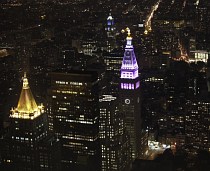2007年VOA标准英语-Urban Glow Hides Stars, Disrupts Animal Life
搜索关注在线英语听力室公众号:tingroom,领取免费英语资料大礼包。
(单词翻译)
By David McAlaryWashington
22 February 2007
As populations and cities grow, our once pristine1 view of the stars is being whitewashed2 by urban glow. Astronomers4, whose view of the heavens is being dimmed, are complaining, but biologists are also decrying5 light pollution because they find it hurts wildlife development and possibly human health, too. VOA's David McAlary reports.
 |
| New York City at night |
"Wouldn't it be a tragedy if in 25 to 30 years time, the only way you could get a view of a really dark sky was either to go on holiday to the Andes or some remote part of Africa or Asia, or go to a planetarium7 in your local town?" he asked. "There are very large parts of the developed world where it's impossible to get a view of a really dark sky."
Several years ago, U.S. and Italian scientists using satellite images created an atlas8 of metropolitan9 light emissions10 worldwide. Astronomer Malcolm Smith of the Cerro Tololo Interamerican Observatory11 in Chile says the images suggest billions of dollars worth of lost energy is flowing upward.
But Smith sees light pollution as a cultural issue as well as economic.
"Culturally, mankind's association with the universe has stimulated12 his development of his cultures," he noted13. "There is a long history involving navigation, art, poetry, all kinds of things involving our connection with the universe we live in. That is being lost bit by bit."
The brightening of the night also worries biologists, who say artificial lighting14 disrupts bird migration15 and the development and behavior of several other animals. At a recent [21-22 Feb.] Washington meeting of experts from several fields to discuss the night, evolutionary16 biologist Bryant Buchanan of Utica College in New York State cited studies showing that fewer frogs and salamanders metamorphose when the night sky is lighter17, and pond snails18 do not grow as large as normal.
"Because all life on this planet has evolved under conditions with distinct day and night cycles," he explained. "The metabolisms19 of organisms have evolved in response to those distinct day and night light cycles and are regulated by a number of hormones21 that are affected22 by light."
Chief among them, says Buchanan, is melatonin, a hormone20 stimulated by darkness to play a key role in regulating the sleep-wake cycle and cell division. Scientists say reduced melatonin production is a likely factor in the significantly higher cancer rates in night workers, and they propose that modern night lighting contributes to the larger incidence of some cancers in the industrial world.
There have been inroads against ever growing urban illumination. The International Dark Sky Association in Tucson, Arizona, a group that claims 3,600 members in more than 70 countries, says efforts to curb23 excess light are under way from the Australian Outback to Britain's Sherwood Forest. In the Czech Republic, an anti-air pollution law also fights light pollution by requiring shielded fixtures24 to block upward beams. Laws have also been enacted25 in Chile, thanks to persuasive26 astronomers who staff the three big observatories27 there.
Several U.S. states have also restricted outdoor lighting. International Dark Skies Association co-founder, U.S. amateur astronomer Tim Hunter, says controls in Tucson near the Kitt Peak National Observatory have been effective.
"In Tucson, Arizona, which is a rapidly growing city, the amount of light that hangs over the city that affects Kitt Peak has not really increased over the last number of years, even though the city has grown," he said.
Hunter's partner in the dark skies group, astronomer David Crawford, says the organization is working with industry to improve lighting. He cites technological28 advances such as light-emitting diodes, the kind of light used in cellphones. They run cool and save energy, but can also be night-friendly because they project light only where directed, not in all directions like incandescent29 bulbs.
Crawford says local governments and utilities have also begun to incorporate dimming controls in highway lighting.
"Don't overlight, because if you overlight, you are actually ruining the eye's adaptation and wasting a lot of energy," he noted. "So use the right amount of light. So you need different levels in the center of New York City or a Washington street than you do out in the country, where you may not need it at all."
Crawford's motto is Preserve the Night.
 收听单词发音
收听单词发音 




